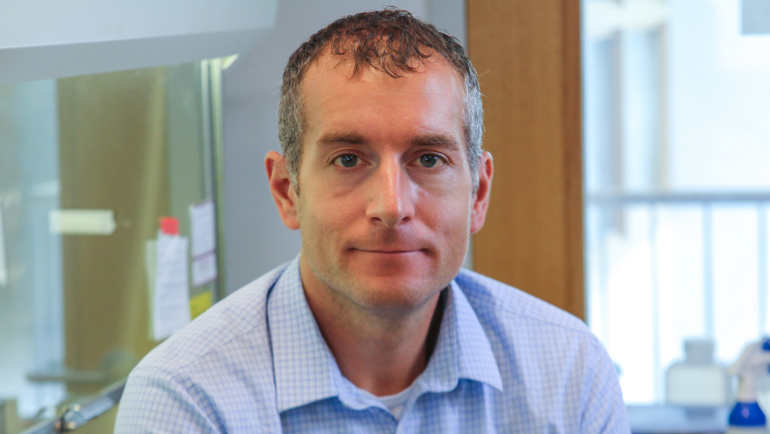Wayne State professor awarded Lou Guillette Jr. Outstanding Young Investigator Award

DETROIT — Christopher Kassotis, Ph.D., assistant professor of pharmacology in Wayne State University’s School of Medicine and the Institute of Environmental Health Sciences, has been chosen to receive the 2024 Lou Guillette Jr. Outstanding Young Investigator Award from the Healthy Environment and Endocrine Disruptor Strategies (HEEDS) organization. HEEDS is a coalition of scientists who are helping to provide the research framework needed to facilitate change in the manufacturing, marketing and management of endocrine disrupting chemicals (EDCs) and ultimately educate policy makers, regulatory agencies, physicians and the public about their potential damaging effects.
The award is given annually to an outstanding young scientist working on some aspect of endocrine disruption research in memory of Lou Guillette, Jr., Ph.D., the former director of the Marine Biomedicine & Environmental Sciences Center and professor at the Medical University of South Carolina. Guillette had a profound influence on the field of endocrine disruption research. Those selected for the award embody Guillette's love of science, communication and commitment to mentoring.
Kassotis’ research is focused on identifying and characterizing EDCs and mixtures, and their potential impacts on human and animal health, with a focus on metabolic health.
“My research uses a mixture of cell culture mechanism assays, coupled with zebrafish and mouse models to characterize molecular mechanisms underpinning potential impacts of multiple EDCs on human and animal health,” said Kassotis. “It is our goal to help shift regulations toward more inclusion of mixture exposure considerations to better protect public health. My lab aims to improve chemical risk assessment models to account for everyday exposures to hundreds of different chemicals and, ultimately, will lead to better protection of human health.”
EDCs interfere with the function of the endocrine system – the hormones that coordinate the health and function of all organs in the body. Hormones are critical for normal body functions throughout life. EDCs can mimic the actions of hormones, block the actions of hormones or change how the body makes or breaks down natural hormones. EDCs are created for a specific purpose such as plastics, pesticides and more, but due to their structural similarities to natural hormones, they can have side effects that interfere with normal hormone function.
“Dr. Kassotis’ research on the health effects of endocrine-disrupting chemicals such as those found in fracking fluids and artificial turf is a critical area of work because of the potential health implications they can cause,” said Ezemenari M. Obasi, Ph.D., vice president for research & innovation at Wayne State University. “This recognition of his research, outreach and mentoring by HEEDS is reflective of the important work he is doing that ultimately will impact the lives of many for years to come. I look forward to his future accomplishments.”
Kassotis received his B.S. in biology from Keene State College, his Ph.D. in biology with a concentration in endocrinology from the University of Missouri and was a postdoctoral fellow at Duke University. He joined Wayne State University in 2020.
# # #
About Wayne State University
Wayne State University is one of the nation’s pre-eminent public research universities in an urban setting. Through its multidisciplinary approach to research and education, and its ongoing collaboration with government, industry and other institutions, the university seeks to enhance economic growth and improve the quality of life in the city of Detroit, state of Michigan and throughout the world. For more information about research at Wayne State University, visit research.wayne.edu.
Wayne State University’s research efforts are dedicated to a prosperity agenda that betters the lives of our students, supports our faculty in pushing the boundaries of knowledge and innovation further, and strengthens the bonds that interconnect Wayne State and our community. To learn more about Wayne State University’s prosperity agenda, visit president.wayne.edu/prosperity-agenda.
Contact info
Julie O'Connor
Director, Research Communications
Phone: 313-577-8845
Email: julie.oconnor@wayne.edu